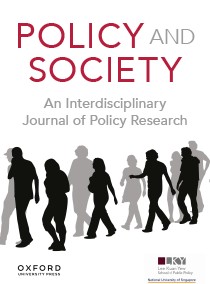统计能力的发展和知识基础设施的建立
IF 5.7
1区 社会学
Q1 POLITICAL SCIENCE
引用次数: 3
摘要
将统计能力建设作为可持续发展目标(sdg)的衡量指标,给联合国系统的统计决策者带来了两难境地,因为一些人认为将统计能力纳入SDG17是一种“利益冲突”,使他们的工作既是可持续发展目标的目标,也是实现这些目标的手段。2022年,有五个指标用于衡量各国的统计能力和为加强统计能力而提供的支持,其中一个指标用于衡量一国监测可持续发展目标本身的能力。在本文中,我认为将统计能力的认知基础设施纳入可持续发展目标框架是一个特殊案例。通过分析构成国家和全球层面统计能力的数据、行动者、网络和进程之间的相互联系,我们可以了解这些材料和过程在构成可持续发展目标更大的政策议程方面的核心地位,以及对统计能力旨在解决的问题的辩论。与可持续发展目标框架中的所有指标一样,统计能力指标是实绩指标——由全球统计界定义和描述,这也有助于定义和描述可持续发展目标框架的发展问题。然而,与其他指标不同的是,统计能力指标还具有为“可持续发展目标框架本身”创造可能性条件的附加权重。这样,关于什么是统计能力及其加强的辩论也是关于政策议程所有权的辩论,也是地方和全球之间紧张局势爆发的地方。本文章由计算机程序翻译,如有差异,请以英文原文为准。
Statistical capacity development and the production of epistemic infrastructures
Designating statistical capacity development as a target for measurement in the Sustainable Development Goals (SDGs) created a dilemma for statistical decision-makers in the United Nations system, as some saw the inclusion of statistical capacity in SDG17 as a “conflict of interest,” making their work both a goal of the SDGs and a means to achieve them. In 2022, there are five indicators for measuring both the statistical capacity of individual countries and the support provided to strengthen it, including one indicator for measuring a country’s ability to monitor the SDGs themselves. In this article, I argue that the epistemic infrastructuring of statistical capacity into the SDG framework is a privileged case. By parsing the interconnections between the data, actors, networks, and processes that constitute statistical capacity on national and global levels, we can understand how central these materialities and processes are in constituting the larger policy agenda of the SDGs as well as debates over the problems that statistical capacity is meant to solve. Like all indicators in the SDG framework, statistical capacity indicators are performative – defined and delineated by the global statistics community that also helps define and delineate the SDG framework’s development problems. Unlike other indicators, however, statistical capacity indicators have the added weight of also producing the conditions of possibility for the “SDG framework itself.” In this way, debates over what constitutes statistical capacity and its strengthening are also debates about ownership of policy agendas and where tensions between the local and global erupt.
求助全文
通过发布文献求助,成功后即可免费获取论文全文。
去求助
来源期刊

Policy and Society
Multiple-
CiteScore
18.00
自引率
6.50%
发文量
43
审稿时长
30 weeks
期刊介绍:
Policy and Society is a prominent international open-access journal publishing peer-reviewed research on critical issues in policy theory and practice across local, national, and international levels. The journal seeks to comprehend the origin, functioning, and implications of policies within broader political, social, and economic contexts. It publishes themed issues regularly and, starting in 2023, will also feature non-themed individual submissions.
 求助内容:
求助内容: 应助结果提醒方式:
应助结果提醒方式:


